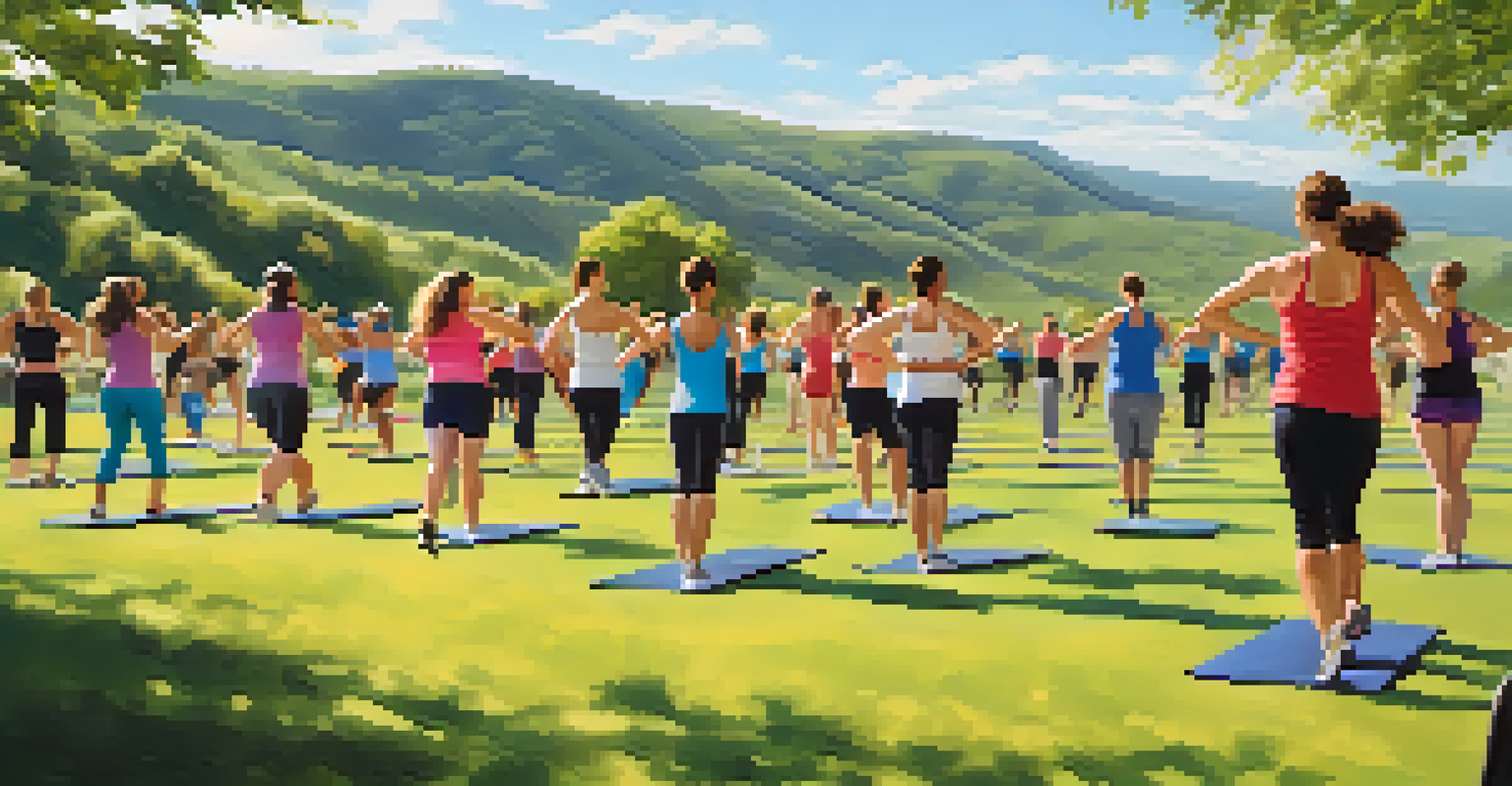The Benefits of Active Lifestyle for Fitness Goals

Understanding an Active Lifestyle: What Does It Mean?
An active lifestyle typically refers to incorporating physical activity into your daily routine. This can include anything from taking the stairs instead of the elevator to engaging in structured workouts. The key is to find activities that you enjoy, making it easier to stay consistent.
Take care of your body. It's the only place you have to live.
It's important to note that an active lifestyle doesn't mean you have to spend hours at the gym. Simple actions, like walking, gardening, or playing with your kids, can significantly contribute to your fitness goals. The goal is to move more and sit less, creating a habit that becomes second nature.
By embracing an active lifestyle, you set a foundation for better health, improved mood, and enhanced energy levels. Each small step you take can lead to significant changes over time, painting a picture of wellness that is both achievable and sustainable.
Boosting Physical Health Through Regular Activity
One of the most immediate benefits of an active lifestyle is the improvement in physical health. Regular exercise helps strengthen your heart, improve circulation, and lower the risk of chronic diseases. It’s like giving your body a tune-up, ensuring everything runs smoothly.

Moreover, physical activity plays a crucial role in weight management. When you burn more calories than you consume, you create a calorie deficit, which is essential for losing weight. This doesn't mean you have to restrict your diet dramatically; rather, it encourages balance and moderation.
Active Lifestyle Benefits Health
Incorporating regular physical activity improves both physical and mental health while reducing the risk of chronic diseases.
Incorporating movement into your life can also increase your longevity. Research shows that even small amounts of activity can have positive effects on your lifespan, making exercise a key player in your overall health narrative.
Enhancing Mental Health with Movement
Engaging in regular physical activity is not just beneficial for your body; it's also a powerful tool for your mind. Exercise releases endorphins, often referred to as 'feel-good' hormones, which can help alleviate feelings of stress, anxiety, and depression. Think of it as a natural mood booster.
Movement is a medicine for creating change in a person's physical, emotional, and mental states.
Furthermore, getting active can improve cognitive functions, such as memory and focus. When you exercise, blood flow increases to your brain, enhancing its performance. This is why many people find that a quick walk can help clear their mind before tackling a challenging task.
An active lifestyle can also foster a sense of accomplishment and boost self-esteem. As you meet your fitness goals, whether big or small, you gain confidence in your abilities, creating a positive feedback loop that encourages further progress.
Building Stronger Social Connections Through Activity
An active lifestyle often creates opportunities for social engagement. Whether it's joining a local sports team, attending fitness classes, or simply walking with friends, these activities foster community and connection. Engaging with others can make the journey towards fitness feel less daunting and more enjoyable.
Moreover, sharing fitness goals with friends or family can enhance motivation. Having a workout buddy or participating in group activities can encourage accountability and make the process more fun. It’s easier to stick to your goals when you have a support system cheering you on.
Social Connections Enhance Fitness
Engaging in physical activities with others fosters community, boosts motivation, and enhances emotional well-being.
These social interactions also contribute to improved mental health. Feeling connected to others can combat loneliness and promote a sense of belonging, which is vital for emotional well-being.
Creating Sustainable Habits for Long-Term Success
An active lifestyle is all about consistency. It’s essential to develop habits that you can maintain over the long term, rather than relying on short-term fixes. By gradually building your activity level, you’ll find it easier to stick with your routine.
Setting realistic and achievable goals is crucial in this process. Start small, like aiming for 10,000 steps a day or dedicating a few minutes to stretching. These small goals can lead to larger milestones, creating a sense of progress that keeps you motivated.
Remember, the key to sustainability is enjoyment. If you find activities that you love, you’re more likely to make them a regular part of your life. This way, fitness becomes a rewarding experience rather than a chore.
Incorporating Variety to Keep Things Fresh
Variety is the spice of life, and this holds true for maintaining an active lifestyle. Engaging in different types of activities can prevent boredom and keep you excited about your fitness journey. From hiking and cycling to yoga and dance, there are endless options to explore.
Mixing up your routine not only keeps things interesting but also challenges your body in new ways. Different activities can work various muscle groups and improve overall fitness, making you a well-rounded athlete. Plus, trying new things can lead to discovering hidden passions.
Nutrition Supports Active Living
Proper nutrition complements an active lifestyle by providing the necessary fuel for performance and recovery.
Don't hesitate to switch things up regularly. Joining a new class, exploring a new trail, or even trying out a sport you’ve never played can renew your enthusiasm and commitment to your fitness goals.
The Role of Nutrition in an Active Lifestyle
While an active lifestyle is crucial for achieving fitness goals, proper nutrition plays an equally important role. Fueling your body with the right nutrients can enhance performance and recovery. Think of your body as a car; to run efficiently, it needs high-quality fuel.
Incorporating a balanced diet rich in whole foods, such as fruits, vegetables, lean proteins, and whole grains, ensures your body has the energy it needs for daily activities. Hydration is also key; drinking enough water keeps your body functioning optimally, especially during physical exertion.

Ultimately, the synergy between an active lifestyle and good nutrition sets the stage for reaching your fitness goals. It’s about creating a holistic approach to health that nourishes both your body and your mind.